
When I wrote that the Greek Orthodox Church is dominant in both Greece and Greek Cyprus as well, I received a lot of angry reactions. For me religion is one of the main problems on Cyprus.
Yesterday, Archbishop Chrysostomos II announced that his Church will go into solar energy.
Read it here. There is nothing wrong with that but don't deny that the Greek Orthodox Church is pretty involved in politics as well.




4 comments:
Hans
You’re wrong to think that the church is ‘dominant’ in Greece and Cyprus. For sure – particularly in Cyprus – it has significant cultural influence – but politically – in the narrow sense – church influence is minor. Also, you’re wrong to think the conflict in Cyprus is essentially religious. It is a factor – note the gleeful destruction in the Turkish-occupied areas of churches, monasteries and cemeteries and the widespread rape of Greek women by Turkish soldiers during the 1974 invasion (surely a result of Muslim contempt for Christian women, regarding them as having loose morals and unworthy of respect) – but I don’t think religious intolerance on the island is deep or has ever driven the conflict.
Dear Achilles,
Secular Turkish ideology doesn't match with Greek Orthodox.
It's a simple statement based upon my visits and work in all the 4 countries.
I agree that the invasion in 1974 turned out to be an occupation. With R. Denktash (as one of the members of the 'deep state Turkey') left many people in Cyprus in limbo. The occupation is illegal, and the destruction, which I saw with my own eyes, of many churches was and is a 'taliban' act. But, the Greeks were provoking and commit many astrocities before the Turkey came into action.
Thanks for your comment
Kindest
Hans
Cyprus and Greece are democracies in which there are many voices asking to be heard. The Greek Orthodox church is just one of those voices. Sometimes people will be persuaded by the church, sometimes they won’t. Other political voices are more powerful, I believe. I agree that the Greek church in Cyprus and Greece is a more visible presence than churches elsewhere in Europe, but I put this down to cultural rather than political influence. Certainly, if Archbishop Chrysostomos of Cyprus were to say tomorrow vote for such and such a person in elections, he would, first, be heavily criticised for interfering in politics and, second, his advice would largely be ignored by the vast majority of people.
Also, don’t fall into the trap of believing that Turkey invaded Cyprus to save the Turkish Cypriots from Greek ‘atrocities’. Turkey had been planning to partition the island since the 1950s. Certainly, there was violence between Greek and Turkish Cypriots in the 1960s, but it’s wrong to depict the Turkish Cypriots as passive victims in these troubles. Turkish Cypriot mujahideen (as they called themselves) used terror tactics in their campaign to partition the island and they are just as guilty of Greek Cypriots of committing ‘atrocities’. Still, whatever crimes occurred in the 1960s, these were nothing compared to the crimes committed by the Turks in 1974. Nor, as you say, can the violence of the 1960s justify the continuing Turkish occupation.
On a happier note, I’ve just discovered your blog and I like it very much; you have a unique perspective on the Eastern Mediterranean. Keep up the good work!
Thanks for the compliment Achiles.
regarding Turkish/Greece conflict: I know that Denktash was expelled from Cyprus in 1958. The guy wanted to be president of his own state and started preparation in the fifties, like the Greek ENOA did.
Its an endless discussion. But as long as the 'old guys' have a say in this. nothing wil change..
The TSK knows exactly that they have to leave one day...but there must be a peaceful transformation..
Kindest
Post a Comment